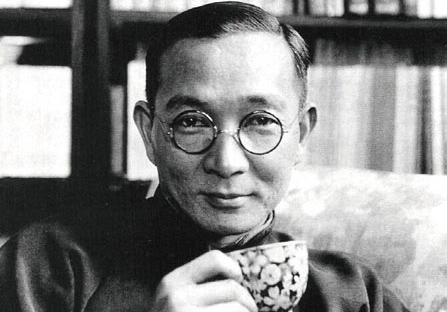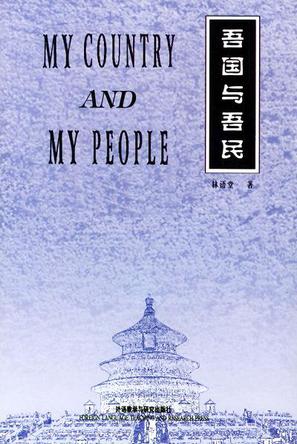Overseas students as cultural ambassadors in early 20th century

Widely known to English readers, Lin Yutang is the exemplar of Chinese cultural ambassadors in early 20th century.

My Country and My People
Frail and deteriorating, modern China was overwhelmed by Western cultural influence at the turn of the 20th century. Nonetheless, China has since been actively incorporating the essence of Western civilization, and Chinese culture has never stopped spreading to the outside world. A vital vehicle for the westward expedition of Chinese culture, Chinese students abroad made substantial contributions to the transmission of indigenous knowledge during the early 1900s.
Translation practice
Missionaries and Chinese coolies were the primary source of Western understanding on China before the outbreak of World War I. Compared with coolies and missionaries, students were better qualified in terms of cultural awareness and academic competence. Moreover, they had access to an extensive and direct network of cultural transmission, and their works were more informative and profound.
To be more specific, their efforts to promote Chinese culture were usually carried out through translating Chinese works into foreign languages. We can draw several conclusions from the practices of Chinese students abroad. First, judging from the quantity of their translation output, these students were highly accomplished, regardless of where they studied. Some students were amazingly productive, including such exemplary figures in academic and literary circles as Wing-Tsit Chan (1901-94) and Lin Yutang (1895-1976).
Furthermore, these students demonstrated extraordinary ingenuity in selecting source texts. Their preferences could be classified into three categories. The first category covered core canons of Confucianism, Taoism and Chinese Buddhism, such as The Wisdom of Confucius, edited and translated by Lin Yutang; Philosophy of Zhuangzi, and Platform Sutra, translated by Wing-Tsit Chan.
The second category included modern academic classics, such as the Russian version of Li Hongzhang, authored by Liang Qichao (1873-1929) and translated by Zhang Qingtong (1872-1937), and the French version of The Evolution of Tao in Pre-Qin Eras, written by Guo Moruo (1892-1978) and translated by Bao Wenwei (1902-91).
The third category involved literary masterpieces of ancient and recent times, ranging from classical poems, Ming (1368-1644) and Qing (1616-1911) novels, and great works of modern writers.
In general, translations produced by foreign-educated Chinese students were elegant and precise, and some were highly influential in their respective fields. Unmatched by their peers who were foreign sinologists and missionaries, overseas Chinese students had a proficiency in translation built on a deep understanding of domestic culture and literary expressions as well as a deft command of foreign languages.
Original works
In addition to translations, foreign-educated Chinese students also independently created an abundance of China-related titles in foreign languages. Compared with their translations, these works were no less vital to the westward transmission of Chinese civilization. To a certain extent, they amounted to a more powerful medium for the promotion of Chinese culture because they presented homespun narratives and styles in a way that closely conformed to the language norms, inclinations and mentalities of foreign readers.
Original works by Chinese students abroad fell into three categories. China-related literature is the first type. Notable representatives of this type included the American-educated Lin Yutang, the British-educated Ye Junjian (1914-99), the French-educated Sheng Cheng (1899-1996) and the Russian-educated Xiao San (1896-1983).
The second type involved introductory texts on Chinese arts and literature. Examples are the summary of the May Fourth “new literature”, by the British-educated Xiao Qian (1910-1999), the overview on Chinese paintings and arts by the British-educated Jiang Yi (1903-1977), and the survey of traditional Chinese music by the German-educated Wang Guangqi (1892-1936).
The third type refers to works that offered a comprehensive illustration of the Chinese national character. Completed in English from 1933 to 1934, Lin Yutang’s My Country and My People offered an elaborate portrayal of the disposition, psyche and ideals of the Chinese people. Acclaimed as shedding a true light on the Chinese national character, the sensational book was printed and distributed seven times within four months.
Furthermore, foreign-educated students also wrote theses on Chinese history, philosophy, religions, arts and literature, which informed Western scholars about the various facets of Chinese traditions. Yet overseas student were no less concerned with the status quo of their motherland. They intended to serve and save the country with their expertise. For instance, almost all concrete problems that plagued Chinese education were discussed at length in nearly 60 doctoral dissertations completed by Chinese students studying in America.
Miscellaneous activities
Foreign-educated Chinese students also lent direct support to Western academics. Many of them taught Chinese language and culture at universities overseas, such as Zhao Yuanren (1892-1982), Yang Liansheng (1914-90), Ji Xianlin (1911-2009), Lao She (1899-1966) and Xiao Qian. Chinese students, such as Ji Xianlin, Yang Liansheng and Tang Degang (1920-2009), also worked as teaching assistants to foreign sinologists and helped them to learn Chinese and systemize Chinese documents.
Chinese students were also engaged in extensive interpersonal networks and various social activities. To foreigners, their behaviors, emotions, dispositions and ideals revealed the spirit of Chinese culture. By virtue of their language competency, it was not difficult for them to get used to new environments, promote Chinese traditions at various gatherings, and engage in intellectual and cultural communications with foreigners. To be more specific, there were active literary and academic exchanges between Japanese cultural circles and renowned figures in modern Chinese history, such as Wang Guowei (1877-1927), Huang Xing (1874-1916), Yu Dafu (1896-1945), Yu Mantuo (1884-1939). Undoubtedly, Chinese culture became more influential in Japan owing to the efforts of Chinese students. In addition, students abroad also organized diverse cultural events and exhibitions, grand or small, through which the essence of Chinese traditions was on display.
Legacies
Chinese students actively promoted Chinese culture while studying abroad in the first half of the 20th century. Diverse, concrete and extensive, their efforts were truly fruitful and meaningful. Owing to their dedication, Westerners acquired a broader and deeper understanding of China and its civilization. East and West thus came closer to each other. An excellent illustration of the concept of cultural diversity, their efforts foretold the retreat of cultural Western-centrism.
Moreover, their work accelerated the growth of overseas China studies, and to a certain extent, became an integral part of it. To be more specific, the vast amount of China-related humanities theses completed by foreign-educated students was conducive not only to the transmission of Chinese culture but to the progress of domestic scholarship.
To conclude, by virtue of their bilingual competence and intercultural awareness, overseas Chinese students were able to give an accurate description of the religious beliefs, moral values, national sentiments and mores of their own people. Generally speaking, macro-environment contributed a lot to the spread of Chinese traditions in the first half of the 20th century. Western civilization was devastated by two world wars, and its self-proclaimed superiority was widely contested and shattered. Meanwhile, the merits of Chinese civilization were rediscovered by Western intellectuals, setting the stage for the outstanding achievements of overseas Chinese students. Last but not least, the late Qing and Kuomintang governments formed a comprehensive set of standardized policies to send students abroad, which was another prerequisite for fruitful cultural transmission.
Yuan Qing is a professor of history at Nankai University. Yue Tingting is a doctoral candidate at the School of History at Nankai University.
